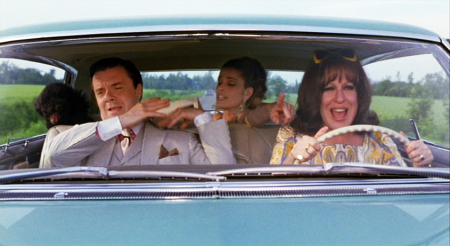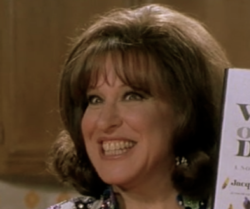The Boston Herald
January 28, 2000 | Verniere, James
Rated R. At Copley Place and suburban theaters.
three stars
A kooky labor of love, “Isn’t She Great” confidently sports no question mark in the title and stars the Divine Miss M as Austin Powers’ favorite writer Jacqueline Susann.
Susann, as some may remember if this film is to have any shelf life at all, was the failed actress-turned-best-selling author of the shag-a-licious novels “The Valley of the Dolls,” “The Love Machine” and “Once Is Not Enough.” While she didn’t quite change the face of American publishing with her poodle and Pucci wardrobe and her sex-crazed, pill-popping starlets eager to trade their nubile flesh for movie roles as long as the supply of uppers and downers never ran out, Jacqueline Susann was something else, all right.
Her fame was a bona fidetriumph of the will, if not the quill, and her sex-crammed novels, typed apparently all in capital letters, were the literary and dietetic equivalent of potato chips. But ordinary people read them by the millions. On a whirlwind publicity campaign to sell Jackie’s first novel, husband-manager Irving Mansfield (Nathan Lane) lovingly describes “The Valley of the Dolls” as “like ‘Gone With the Wind,’ only filthy.” Although Susann owed a debt to schlockmeisters Harold Robbins and Sidney Sheldon, she was the pre-feminist pioneer in the field, and she gave birth to a thousand imitators and a few unforgettably godawful films.
The kitschy cult of Jackie Susann, who died in 1974, might be panting at the prospect of this movie for all I know, and they might even embrace this sitcomish effort. Directed by Andrew Bergman (“The Freshman,” “Striptease”) from a script by Paul Rudnick (“In & Out”), Midlerplays Susann as a force of nature, and her trashy, retro wardrobe alone is worth the price of admission. In a scene in which her uptight WASP editor (a typecast but funny David Hyde Pierce) first meets Jackie and Irving, Midler rocks the house merely by making three separate entrances in three smashingly hilarious frocks.
Stockard Channing also scores as Jackie’s best friend and muse, the ab-fab New York actress Florence Maybelle. And in a small role John Cleese, sporting his own hilariously outre fashions, is splendidly randy as Jackie’s tasteless publisher.
But the film, which is based on the New Yorker story “Wasn’t She Great” by Michael Korda and features two new songs by ’60s pop icon Burt Bacharach, is too polite and strives too hard to make Jackie a heroine. This is not “A Star Is Born” despite Bergman’s leanings in that direction. Two scenes in which Jackie and Irving stand under a tree in Central Park and talk to God would have been enough. Jackie and Irving’s visits to see their institutionalized, autistic son are anesthetic. Jackie’s courage in the face of her breast cancer, on the other hand, is allowed to speak for itself.
Typical of the movie is its re-creation of Jackie’s legendary appearance on “The Tonight Show.” In real life, a viperish Truman Capote was seated to Susann’s immediate right, and, no doubt jealous of her success, felt obliged to insult her, declaring she looked “like a truck driver in drag.” In the film, Jackie appears, “Zelig”-like, with a ’60s-vintage Johnny Carson, but Capote makes his remarks alone and on another show. Later, Jackie and Irving hobnob in the Aegean with Aristotle Onassis (Frank Vincent) and “the other Jackie.” But the filmmakers respectfully keep “the other Jackie” off-camera. They might be afraid of being accused of bad taste, but Jackie Susann never was. Moreover, the film upstages itself by showing us a scene from the deliriously awful 1967 film “The Valley of the Dolls.” The moral is: There’s no trash like real trash.







